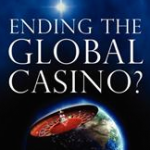- 13 million Americans will loose their medical insurance.
- 18 million Americans are living in deep poverty, they are living below the official poverty limit; another 27 million are living below an income of $ 15.000. These numbers will grow. Poverty in the US is attended with political exclusion.
- bridges will collapse, roads will deteriorate.
- a program of medical care for 9 million children will not be continued.
- water- and sanitary utilities in the US are below the level of other western countries – this will not improve.
- the number of homeless people is increasing and will continue to do so.
- the country has relatively less medical doctors and hospital beds than other developed countries – this will become worse.
- drugs addiction will rise.
- the income share of the lower half of the population is 13 % (in 1980: 20 %); this percentage will fall further.
- the richest 1 % of the population is earning 20 % of the GNP (in 1980 this was 10 %); this number will grow. Inequality will grow.
- the national budget deficiency will rise with $ 1649 billion till 2027; this will contribute to the bathtub government the Republicans strive for. Several government services will not be possible anymore.
- Social mobility in the US is, compared with other industrialized countries, low and will decrease. So far as regards the American Dream.
- The real estate sector, president Trump in the first place, will benefit enormously from the new tax reform.
These are all consequences of the new Tax Reform that the Republicans in Senate and House of Representatives gave as a Christmas present to the American People. Mind you: all Republicans, even the so called reasonable Republicans like John McCain, Jeff Flake and Susan Collins supported this reform. After eight years of obstruction of everything president Obama wanted to accomplish, this is the first and until now the only result they attained after a year in office. Btw, two third of the American people didn’t want this ‘present’ (although one third of them shouldn’t complain, after they brought these people in office with the last election). This of course is understandable, because actually this is not a present. Tax money is earned by all Americans together by producing, serving and consuming. This tax bill is taking the money first, and then redistributing it in a very unfair way. I call this trespassing of the eighth commandment (Ex.20:15). Politics executed by representatives elected by evangelicals and christian grass roots. Charity – what do you mean?
The effects of this tax bill can hardly be overestimated. It will determine the American landscape for years, probably decades. It will increase major divisions and hostility within the nation. It will promote racism and violence. It will damage the economic development. It will damage nature and obstruct any climate policy. (Until now states may deduct most public expenditure from the amount they have to contribute to the federal government – the Republicans want to abolish this rule). It will show dilapidation all over the country. Relations with other countries will be severely disturbed, trade will become more difficult due to high import taxes (that will be returned by other countries). The US will loose their moral leadership in the world, because it will break the fundamental rights it says to endorse: Life, Liberty and the pursuit of Happiness. In the end it will loose its power. Everyone, also we here in Europe, will suffer from this to some degree.
As John said, in the deepest darkness the light still shines. In this case that is the victory of Doug Jones over Roy Moore in the Alabama senator election. And maybe the Democrats will win the elections of 2018 and 2020. But even so, it is not that easy to undo all the consequences of this tax bill. It will take a landslide to limit the damage. That probably won’t happen. More likely is a revolution – history teaches that reigns that promote inequality deliberately, like today the US government, most of the time collapse in chaos and violence.
This all of course could be known by any educated person, so by the majority of Republican representatives. One wonders: how then can they take such a criminal decision? There are only two possibilities: either they don’t have any conscience; or they suppress it very effectively. So either they are seriously handicapped (like president Trump), or they are criminals, or both. This is what is left of the GOP, the party of Abraham Lincoln, Theodore Roosevelt and Dwight Eisenhower.
Anyway, it is not a pleasant sight to see the decay of a country that I loved and admired. I feel compassion with my friends, and all the decent people who are living there. My new year wishes for you, and indeed for all of us, is that we shall have the resilience to endure all this, and the courage to speak up when it is needed. Bless you all.
Sources: Philip Alston, UN social rapporteur, Statement on vision to the USA; Gabriel Zucman, Emmanuel Saez, Thomas Piketty, World Inequality Report 2018; Maartje Somers in: NRC/Handelsblad 12-20-2017; Frans Verhagen in: NRC/Handelsblad 12-9-2017.
Disclaimer: I apologize for mistakes in my English. Blogs are cursory – not stuff for correction by a native speaker.



